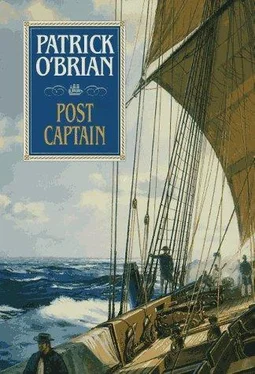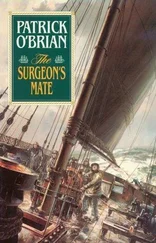Patrick O'Brian - Post captain
Здесь есть возможность читать онлайн «Patrick O'Brian - Post captain» весь текст электронной книги совершенно бесплатно (целиком полную версию без сокращений). В некоторых случаях можно слушать аудио, скачать через торрент в формате fb2 и присутствует краткое содержание. Жанр: Книги. Описание произведения, (предисловие) а так же отзывы посетителей доступны на портале библиотеки ЛибКат.
- Название:Post captain
- Автор:
- Жанр:
- Год:неизвестен
- ISBN:нет данных
- Рейтинг книги:5 / 5. Голосов: 1
-
Избранное:Добавить в избранное
- Отзывы:
-
Ваша оценка:
- 100
- 1
- 2
- 3
- 4
- 5
Post captain: краткое содержание, описание и аннотация
Предлагаем к чтению аннотацию, описание, краткое содержание или предисловие (зависит от того, что написал сам автор книги «Post captain»). Если вы не нашли необходимую информацию о книге — напишите в комментариях, мы постараемся отыскать её.
Post captain — читать онлайн бесплатно полную книгу (весь текст) целиком
Ниже представлен текст книги, разбитый по страницам. Система сохранения места последней прочитанной страницы, позволяет с удобством читать онлайн бесплатно книгу «Post captain», без необходимости каждый раз заново искать на чём Вы остановились. Поставьте закладку, и сможете в любой момент перейти на страницу, на которой закончили чтение.
Интервал:
Закладка:
‘Oh dear, oh dear,’ cried Plaice. ‘He’s a-taking off his coat. We should never have let him off alone on those - -sands. Mr Babbington said “Do not let him go a-wandering on them - - sands, Plaice, or I’ll have the hide off your back”. Ahoy! The Doctor ahoy, sir! Come on, mates, stretch out, now. Ahoy, there!’
Stephen took off his shirt, his drawers, his catskin comforter, and walked straight into the sea, clenching his mouth and looking fixedly at what he took to be the stump of mast under the pellucid surface. They were valuable boots, soled with lead, and he was attached to them. In the back of his mind he heard the roaring desperate hails, but he paid no attention: arrived at a given depth, he seized his nose with one hand, and plunged.
A boathook caught his ankle, an oar struck the nape of his neck, partly stunning him and driving his face deep into the sand at the bottom: his foot emerged, and he was seized and hauled into the boat, still grasping his boots.
They were furious. ‘Did he not know he might catch cold?
- Why did he not answer their hail? It was no good his telling them he had not heard; they knew better; he had not got flannel ears - Why had he not waited for them?
- What was a boat for? - Was this a proper time to go a-swimming? - Did he think this was midsummer? Or Lammas? - He was to see how cold he was, blue and trembling like a fucking jelly. - Would a new-joined ship’s boy have done such a wicked thing? No, sir, he would not. - What would the skipper, what would Mr Pullings and Mr Babbington say, when they heard of his capers?
- As God loved them, they had never seen anything so foolish: He might strike them blind, else. - Where had he left his intellectuals? Aboard the sloop?’ They dried him with handkerchiefs, dressed him by force, and rowed him quickly back to the Polychrest. He was to go below directly, turn in between blankets - no sheets, mind -with a pint of grog and have a good sweat. He was to go up the side now, like a Christian, and nobody would notice. Plaice and Lakey were perhaps the strongest men in the ship, with arms like gorillas; they thrust him aboard and hurried him to his cabin without so much as by your leave, and left him there in the charge of his servant, with recommendations for his present care.
‘Is all well, Doctor?’ asked Pullings looking in with an anxious face.
‘Why, yes, I thank you, Mr Pullings. Why do you ask?’
‘Well, sir, seeing your wig was shipped arsy-versy and your comforter all ends up, I thought may be you had had a misfortune, like.’
‘Oh, no: not at all, I am obliged to you. I recovered them none the worse - I flatter myself there is not such a pair in the kingdom. The very best Cordova ass’s leather. They will not suffer from a thoughtless hour’s immersion. Pray, what was all the ceremony as I came into the ship?’
‘It was for the Captain. He was only a little way behind you - came aboard not five minutes ago.’
‘Ah? I was not aware he had been out of the ship.’
Jack was obviously in high spirits. ‘I trust I do not disturb you,’ he said. ‘I said to Killick, “Do not disturb him on any account, if he is busy.” But I thought that with such a damned unpleasant night outside, and the stove drawing so well in, that we might have some music. But first take a sup of this madeira and tell me what you think of it. Canning sent me a whole anker - so good-natured of him. I find it wonderfully grateful to the palate. Eh?’
Stephen had identified the smell that hung about Jack’s person and that wafted towards him as he passed the wine. It was the French scent he had bought in Deal. He put down his glass composedly and said, ‘You must excuse me this evening, I am not quite well, and I believe I shall turn in.’
‘My dear fellow, I am so sorry,’ cried Jack, with a look of concern. ‘I do hope you have not caught a chill. Was there any truth in that nonsense they were telling me, about your swimming off the sands? You must certainly turn in at once. Should you not take physic? Allow me to mix you a strong. .
Shut firmly in his cabin, Stephen wrote. ‘It is unspeakably childish to be upset by a whiff of scent; but I am upset, and I shall certainly exceed my allowance, to the extent of five hundred drops.’ He poured himself out a wineglassful of laudanum, closed one eye, and drank it off. ‘Smell is of all senses by far the most evocative: perhaps because we have no vocabulary for it - nothing but a few poverty-stricken approximations to describe the whole vast complexity of odour - and therefore the scent, unnamed and unnamable, remains pure of association; it cannot be called upon again and again, and blunted, by the use of a word; and so it strikes afresh every time, bringing with it all the circumstances of its first perception. This is particularly true when a considerable period of time has elapsed. The whiff, the gust, of which I speak brought me the Diana of the St Vincent ball, vividly alive, exactly as I knew her then, with none of the vulgarity or loss of looks I see today. As for that loss, that very trifling loss, I applaud it and wish it may continue. She will always have that quality of being more intensely alive, that spirit, dash and courage, that almost ludicrous, infinitely touching unstudied unconscious grace. But if, as she says, her face is her fortune, then she is no longer Croesus; her wealth is diminishing; it will continue to diminish, by her standard, and even before her fatal thirtieth year it may reach a level at which I am no longer an object of contempt. That, at all events, is my only hope; and hope I must. The vulgarity is new, and it is painful beyond my power of words to express: there was the appearance of it before, even at that very ball, but then it was either factious or the outcome of the received notions of her kind - the reflected vulgarity of others; now it is not. The result of her hatred for Sophia, perhaps? Or is that too simple? If it grows, will it destroy her grace? Shall I one day find her making postures, moving with artful negligence? That would destroy me. Vulgarity: how far am I answerable for it? In a relationship of this kind each makes the other, to some extent. No man could give her more opportunity for exercising all her worst side than I. But there is far, far more to mutual destruction than that. I am reminded of the purser, though the link is tenuous enough. Before we reached the Downs he came to me in great secrecy and asked me for an antaphrodisiac.
‘Purser Jones: I am a married man, Doctor.
‘SM: Yes.
‘Jones: But Mrs J is a very religious woman, is a very virtuous woman; and she don’t like it.
‘SM: I am concerned to hear it.
‘Jones: Her mind is not given that way, sir. It is not that she is not fond and loving, and dutiful, and handsome - everything a man could wish. But there you are: I am a very full-blooded man, Doctor. I am only thirty-five, though you might not think it, bald and pot-bellied and cetera and cetera. Sometimes I toss and turn all night, and burn, as the Epistle says; but it is to no purpose, and sometimes I am afraid I will do her a mischief, it is so.
That is why I went to sea, sir; though I am not suited for a naval life, as you know all too well.
‘SM: This is very bad, Mr Jones. Do you represent to Mrs Jones that .
‘Jones: Oh, I do, sir. And she cries and vows she will be a better wife to me - hers is not an ungrateful mind, she says - and so, for a day or two, she turns to me. But it is all duty, sir, all duty. And in a little while it is the same again. A man cannot still be asking; and what you ask for is not given free - it is never the same - no more like than chalk and cheese. A man cannot make a whore of his own wife.
‘He was pale and sweating, pitiably earnest; said he was always glad to sail away, although he hated the sea; that she was coming round to Deal to meet him; that as there were drugs that promoted venereal desire, so he hoped there might be some that took it away and that I should prescribe it for him, so that they could be sweethearts. He swore “he should rather be cut” than go on like this, and he repeated that “a man could not make a whore of his own wife.”‘
Читать дальшеИнтервал:
Закладка:
Похожие книги на «Post captain»
Представляем Вашему вниманию похожие книги на «Post captain» списком для выбора. Мы отобрали схожую по названию и смыслу литературу в надежде предоставить читателям больше вариантов отыскать новые, интересные, ещё непрочитанные произведения.
Обсуждение, отзывы о книге «Post captain» и просто собственные мнения читателей. Оставьте ваши комментарии, напишите, что Вы думаете о произведении, его смысле или главных героях. Укажите что конкретно понравилось, а что нет, и почему Вы так считаете.












